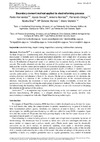Identificador persistente para citar o vincular este elemento:
https://accedacris.ulpgc.es/jspui/handle/10553/42652
| Título: | Boundary element method applied to electroforming process | Autores/as: | Hernández Castellano, Pedro Manuel Socas, Ayoze Benítez Vega, Antonio Nizardo Ortega García,Fernando Díaz Padilla,Noelia Del Carmen Marrero Alemán, María Dolores Monzón Verona, Mario Domingo |
Clasificación UNESCO: | 331212 Ensayo de materiales 331208 Propiedades de los materiales |
Palabras clave: | Additive Manufacturing (AM) Electroforming Rapid Manufacturing Rapid Tooling |
Fecha de publicación: | 2014 | Editor/a: | 0255-5476 | Publicación seriada: | Materials Science Forum | Conferencia: | 5th Manufacturing Engineering Society International Conference (MESIC) | Resumen: | Elecform3DTM is a analysis and simulation tool of electroforming process, in order to facilitate design and manufacturing tasks. Electroforming is an electrolytic process that enables the manufacture of metallic parts with good mechanical properties with a high level of accuracy and reproducibility. In this process a thin metallic shell is deposited on a model part and later released from it. Distribution of deposited metal is not uniform due to current density distribution on the cathode. The results obtained with the first version of this product were very promising, and also indicated the need for a more precise analysis of electrochemical phenomena in this process.The methodology is based on the well-known potentials model of LaPlace, it enables deposited metal distribution prediction with high grade of precision, being experimentally validated with cathodic polarization curves. These boundary conditions at the electrodes serve to combine the existing electrical and chemical effects in the process. On the active surfaces of the electrodes the current density is a function of the nonlinear laws of polarization in the electrode-electrolyte interface. Analytically the resolution of these problems is totally unworkable, at least for real geometries, so it is used for solving the employment of numerical methods. The resolution has been considered using the boundary element method (BEM), because we are only interested in obtaining the solution on the surface of the cathode. Elecform3DTM is an important step beyond electroforming so far, and combined with almost all additive manufacturing 3D printer, is a cheaper alternative for high quality metallic parts manufacturing in comparison with other Rapid Manufacturing technologies. | URI: | https://accedacris.ulpgc.es/handle/10553/42652 | ISBN: | 9783038351252 | ISSN: | 0255-5476 | DOI: | 10.4028/www.scientific.net/MSF.797.125 | Fuente: | Materials Science Forum [ISSN 0255-5476], v. 797, p. 125-132 |
| Colección: | Artículos |
Citas SCOPUSTM
2
actualizado el 08-jun-2025
Citas de WEB OF SCIENCETM
Citations
3
actualizado el 15-feb-2026
Visitas 5
523
actualizado el 15-ene-2026
Descargas
451
actualizado el 15-ene-2026
Google ScholarTM
Verifica
Altmetric
Comparte
Exporta metadatos
Los elementos en ULPGC accedaCRIS están protegidos por derechos de autor con todos los derechos reservados, a menos que se indique lo contrario.
